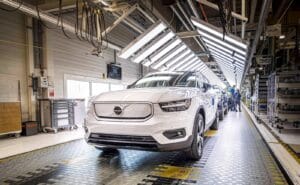
The electric vehicle boom is expanding and Volvo Cars is following the lead of carmakers such as BMW, General Motors and Ford Motor, announcing plans to expand production of electric vehicles.
Volvo said this week it is preparing to triple electric-car manufacturing capacity at its plant in Ghent, Belgium to meet the demand for its Recharge line-up of battery-electric vehicles.
“Our future is electric and customers clearly like what they see from our Recharge cars,” said Javier Varela, head of global industrial operations and quality. “As we continue to electrify our line-up and boost our electric production capacity, Ghent is a real trailblazer for our global manufacturing network.”
(Volvo confirms small EV in the works.)
In December, Volvo Cars also said it planned to assemble electric motors at its powertrain plant in Skövde, Sweden, and expects to establish complete in-house e-motor production by mid-decade. The company is also investing significantly in the in-house design and development of e-motors for the next generation of Volvo cars, the company said.

The steps to increase capacity come as Recharge, as a percentage of Volvo’s total sales, more than doubled last year, Volvo officials, as the company implements plans to become a premium electric car company.
By 2025, Volvo plans call for 50% of its sales to be fully electric cars, with the rest hybrids.
While Ghent is the first of its global manufacturing network to start building fully electric cars, Volvo also has plans to increase electric car manufacturing capacity at its other facilities around the globe, including the company’s assembly plant in South Caroline.
Meanwhile, Ghent is preparing to place a second fully electric Volvo model, based on the CMA modular vehicle architecture, into production later this year. The plant already builds the XC40 Recharge, the company’s first fully electric car, as well as a plug-in hybrid version of the XC40.
(Volvo CEO expects brand to be entirely electric as early as 2030.)
In China and the United States, its two largest individual markets, Volvo reported sales growth for 2020 despite the pandemic-related sales drop in the first half of the year.

“We had a great second half of the year after a tough start, gaining market share in all our main sales regions,” said Lex Kerssemakers, head of Global Commercial Operations. “We aim to build on this positive trend in 2021 as we continue to roll out new electrified Volvos and expand our online business.”
Globally, Volvo Cars sold 661,713 cars in 2020, a decline of 6.2% compared to 2019. Although final numbers for the full year are yet to be confirmed, the company outperformed its competitors and gained market share in all its main sales regions during the first eleven months of the year.
Sales rose by 7.5% in China in 2020, to 166,617 cars, compared to 2019. In the U.S., the company sold 110,129 cars, a 1.8% increase compared to the year before. In both markets, strong demand for the company’s SUVs accounted for the majority of sales.
In Europe, Volvo Cars saw strong demand for its Recharge cars in many key markets. A sluggish overall market, held down by pandemic-related restrictions, meant that overall sales fell by 15.5% for the whole year.
(Volvo launches production of XC40 Recharge, its first long-range BEV.)
Volvo officials also said the pandemic also accelerated the company’s move towards online sales, which will continue to be a focus area in 2021. In 2020, Volvo Cars more than doubled its number of subscriptions sold online versus 2019. Conquest rates via this channel continued to be high, supporting the increase in market share.







